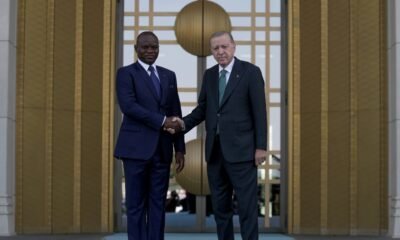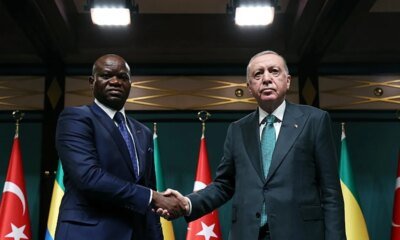Economy
Türkiye-UK trade deal could serve as global ‘example’: Envoy
A planned update to the free trade agreement (FTA) between the U.K. and Türkiye would serve as “a great example” for modern trade deals, according to the British consul general in Istanbul, Kenan Poleo.
The first round of negotiations on the updated agreement concluded positively, covering areas such as goods trade and sustainability, said Poleo, who also serves as the U.K.’s trade commissioner for Eastern Europe and Central Asia.
“The most exciting thing about this new free trade agreement is (that it is) an opportunity for the U.K. and Türkiye to set a great example for the whole world around what a modern free trade agreement between two important partners looks like,” Poleo said in a recent interview with Anadolu Agency (AA).
The next round of negotiations is expected later this year and will focus on developing a road map for expanded cooperation, particularly in services and innovation-driven sectors.
Trade between the two countries currently exceeds 27 billion pounds (approximately $36 billion), making Türkiye one of the U.K.’s largest trading partners, he said.
“Given the depth of our relationship, really, the sky’s the limit,” he added.
Describing trade relations between the two countries as “huge,” Poleo said Türkiye is now one of the U.K.’s largest trading partners, with the relationship having grown significantly in recent years.
“There isn’t a sector where we don’t see positive opportunities,” he said, citing clean energy, advanced manufacturing and mobility as key areas for collaboration.
The U.K. seeks to expand its global trade network post-Brexit, while Türkiye aims to diversify its economic partnerships amid shifting regional dynamics and supply chain realignments.
Eurofighter deal
One of the most recent milestones in bilateral cooperation was the signing of a memorandum of understanding during last month’s International Defense Industry Fair (IDEF) in Istanbul.
The deal paves the way for Türkiye to become a Eurofighter Typhoon operator, a move Poleo described as a “great example” of U.K.-Türkiye collaboration as “strategic and defense partners.”
“A third of those aircraft are going to be built within the U.K.,” he said. “It provides huge opportunities for both countries in terms of defense and security, but also economic growth.”
The Eurofighter is a multirole aircraft equipped with next-generation radar and enhanced air-to-air and air-to-ground combat capabilities.
Cooperation in offshore wind and nuclear power
He also pointed to growing opportunities in offshore wind and next-generation nuclear power.
“We have institutions like the Offshore Renewable Energy Catapult in the north of England, very close to where capabilities are,” he said.
“We’ve developed innovation capability and capacity that have allowed Turkish companies, who are looking to explore those opportunities globally and also in Türkiye, to come and become part of that ecosystem,” he explained.
The British envoy said the U.K. and Türkiye can achieve “world-beating” results by working together in offshore wind.
“There’s an opportunity for Türkiye to leapfrog and a lot of learning, and really develop some capabilities here that could be world-beating working partnership with those Turkish and U.K. companies,” he said. “I’m excited about that opportunity.”
Poleo also said there are opportunities for the two nations to collaborate on developing a regulatory framework that would allow Türkiye to explore more novel and innovative forms of nuclear power.
“There’s an opportunity for us to collaborate and learn from each other on our experiences,” he said.
As Türkiye aims to install 5 gigawatts (GW) of offshore wind capacity by 2035 and advances its first nuclear power plant in Akkuyu, in the southern province of Mersin, while also targeting 5 gigawatts of small modular reactor (SMR) capacity by 2050, the U.K. sees an opportunity to support these ambitions with its global leadership in offshore wind and decades of nuclear expertise.
Farewell to Istanbul
Poleo, who assumed his post in September 2021, is set to complete his tenure in early 2026.
Born in South London to a Turkish Cypriot family, he described his time in Türkiye as both a personal and professional high point.
“This was always my dream job,” said Poleo. “It is both a joy to have served here, but it’s also a tragedy for me that it has to come to an end.”
Reflecting on joint achievements, Poleo highlighted the growing strength of the U.K.-Türkiye business relationship, citing partnerships that span sectors from health tech to aviation.
Switching briefly in Turkish during his farewell speech, Poleo expressed satisfaction at improving his language skills, adding with a smile: “Ailemle dedikoduları anlayabiliyorum” (“I can now understand the gossip in my family”).
Calling Istanbul one of Europe’s greatest cities, Poleo said in Turkish: “Each morning, I wake up to a view of the Golden Horn. That’s a lovely detail for me. Some days, being a British diplomat in this country feels like a dream.”
Poleo first visited Istanbul at 21 as a student, recalling how he once stood outside the British Consulate building and imagined working there someday. “Incredible. I’m a fortunate man,” he said.
Economy
Turkish monthly exports hit $25B mark for 1st time in July
Türkiye’s monthly exports achieved a new historic peak by hitting the $25 billion mark for the first time, according to a top official on Saturday.
Turkish outbound shipments in July surged 11% compared to the year earlier, Trade Minister Ömer Bolat told an event in northern Samsun province, announcing the preliminary data.
He recalled that the value of shipments stood at $22.5 billion in July of last year and drew attention to the fact that an additional $2.5 billion was added to exports when comparing the same month in 2024.
“We broke the highest monthly goods export record in our history in July. Consequently, we broke the highest export record for July in our history and as of July, we reached the highest total goods export figure in our history for the past year,” Bolat said.
“Another encouraging development: a slowdown in the rate of monthly import growth was achieved and the monthly foreign trade deficit in July narrowed significantly compared to the same month of the previous year and compared to June,” he added.
At the same time, he noted that the export-to-import coverage ratio also improved.
“This is what we call a ‘legendary month,’ six major achievements in one. We reached an all-time high in monthly exports at $25 billion, up from $22.5 billion in July last year, an increase of $2.5 billion, or 11%,” the minister said.
Bolat said exports in July increased by $4.5 billion compared to June, adding that the next target is to reach $26 billion in monthly exports.
“Our extraordinary efforts are reinforcing the process of rebalancing and stabilizing our economy,” he emphasized.
Previously, the monthly record in exports was achieved in May this year with $24.8 billion.
He also informed that the foreign trade deficit dropped to $6.4 billion last month, down 12% from $7.3 billion in July 2024, marking the lowest deficit in the past nine months.
Progress despite conflicts
Moreover, when examining January-July exports, he stated that they reached $156.4 billion, representing a 5.2% year-over-year increase.
He said that recent global conflicts, ranging from trade wars and tariff disputes, have caused sharp disruptions in global trade, growth, and commodity prices, including those of energy and gold.
Despite regional instability, Bolat said that under the leadership of President Recep Tayyip Erdoğan, “Türkiye continues its strong rise as a pillar of stability in the economy, foreign policy, defense, transportation and energy.”
He said Türkiye continues its trade diplomacy through multilateral, bilateral, regional and global agreements.
He noted positive progress with the European Commission, saying that 14 trade barriers have been removed, with nine to 10 remaining.
Emphasizing the goal to modernize the Customs Union, Bolat recalled that as a result of constructive talks, a directive was issued to grant longer-term visas to Turkish citizens who have previously traveled to the EU and returned regularly.
Looking at sectors, automotive continued its leadership with $3.8 billion in exports in July. Following automotive were chemicals with $3.4 billion, ready-made clothing with $1.58 billion, electrical and electronics with $1.57 billion and steel with $1.4 billion.
With $3.4 billion in exports last month, the chemicals sector had its best performance yet, with its total shipments from January through July surpassing $19 billion, according to a report by Anadolu Agency (AA).
The head of Turkish Exporters Assembly (TIM), Mustafa Gültepe, in his assessment, noted that almost all of the $2.5 billion increase in exports in July was due to parity with the automotive and chemical sectors.
“We’re not complaining, but for consistent and sustainable growth, we need to include all our sectors in the game,” he commented.
Economy
Gold’s surge set to continue in H2, driven up by central banks
The seemingly unstoppable rise in prices of gold, considered a safe haven in times of turmoil, is expected to continue into the second half of the year, according to traders and financial analysts.
In its latest outlook, the World Gold Council (WGC) predicts that prices will keep climbing, albeit at a slightly slower pace.
Gold has become so expensive that demand from the jewelry sector has slumped. Global consumption by jewelry manufacturers dropped from 435 tons in the first quarter to 356 tons in the second, the WGC reported earlier this week.
Meanwhile, the price of gold has soared to just over $3,300 per troy ounce (31.1 grams), nearly double the level seen in 2022.
Goldman Sachs forecasts it could reach $4,000 by mid-2026.
Analysts point to sustained buying by central banks – especially China’s – as a key driver of this rally, as nations seek to reduce their reliance on the U.S. dollar.
“As long as central banks continue to build up gold reserves, prices will keep moving north,” says Michael Eubel, head of precious metals trading at BayernLB, one of Germany’s leading gold dealers.
“Central banks have been buying around 1,000 tons of gold annually in recent years,” adds Benjamin Summa, a spokesperson for Munich-based gold trader Pro Aurum. “A significant share of that is likely attributable to China.”
Figures from the World Gold Council show that China has increased its gold reserves nearly sixfold since 2000, from 395 tons to 2,292 tons as of the end of the first quarter of 2025. That puts it in seventh place globally. But many experts believe Beijing’s actual holdings are far higher.
“I estimate that China has acquired at least another 500 tons via secondary markets,” says Eubel. China is also the world’s largest gold producer, and “very little of that output is exported,” he adds.
It’s no secret that China’s Communist Party would prefer to end U.S. dominance sooner rather than later. A key component of great-power status is holding significant gold reserves. But China is by no means the only country buying gold.
“These states are aiming to reduce their dependence on the U.S. dollar and are therefore increasingly turning to physical gold,” said Summa. Among them are India, the United Arab Emirates (UAE) and Qatar.
This year, however, the most active buyer isn’t China, but Poland, which has purchased more than 48 tons so far in 2025, according to the WGC – putting it at the top of the list. For many years, Russia was the largest official gold buyer, but it has scaled back purchases since 2020, according to official data.
Economy
Australian state aims to write into law rights on work from home
The premier of the Australian state of Victoria conveyed on Saturday plans to enshrine working from home in law, arguing it should be “a right, not a request.”
Under Jacinta Allan’s plan, workers would be entitled to work from home at least two days a week, if their job allows it.
“We’re doing that because we know what the evidence tells us – workers are more productive, it saves time for families, it saves money for families,” Allan said, launching the proposed policy at the Labor Party’s state conference.
“This change will mean that any worker who can reasonably do their job from home has the right to do so for at least two days a week.”
Allan said the policy would now be put out for consultation with workers, employers, and unions.
She said it was important to “get the details of this important change right.”
Allan said the move could save the average worker $110 a week, cut congestion on roads, and keep more women in the workforce.
During national elections in May, the opposition Liberal-National coalition’s plan to eliminate remote work was partly blamed for its poor performance.
Victoria’s opposition leader, Brad Battin, said that remote work arrangements had been valuable and that he supported measures that promote better work-life balance.
The measure is likely to be introduced in the state parliament next year.
Economy
Türkiye’s trade deficit narrows by 12.1% in July
Türkiye’s trade deficit shrank 12.1% year-on-year in July, Trade Minister Ömer Bolat announced Saturday.
Bolat said exports rose to $25 billion in July, while imports stood at $31.4 billion. He made the comments during a press conference in Samsun.
“The decline in foreign trade deficit was thanks to a strong export performance and controlled import growth,” he said.
In the January-July period of 2025, exports for the first seven months reached $156 billion, while exports for the last 12 months rose to $269.5 billion.
According to Türkiye Exporters’ Assembly (TIM) President Mustafa Gültepe, the $2.5 billion increase in July exports was due to parity in automotive and chemical sectors.
“We are certainly not complaining,” Gültepe said. “But for stable and sustainable growth, we need to bring all sectors into the game.”
July marked Türkiye’s highest monthly export value on record, climbing 11% compared with the same month last year. Service exports are estimated to have reached $11.8 billion.
Automotive led the way with $3.8 billion in exports, followed by chemicals ($3.4 billion), ready-made clothing ($1.58 billion), electrical and electronics ($1.57 billion), and steel ($1.4 billion).
Seventeen sectors posted export growth, while nine saw declines. The top exporting provinces were Istanbul, Kocaeli, Ankara, Bursa, and Izmir, with Ankara, Bolu, Çankırı, Edirne, and Muğla hitting record monthly figures. In July, 1,180 companies exported for the first time.
Türkiye’s main export destinations were Germany, the U.K., the U.S., the UAE, and Italy. Exports to 52 countries rose more than 50%, while 107 countries saw growth above 10%. Overall, exports increased to 137 countries.
Gültepe welcomed the Central Bank’s recent 300 basis point interest rate cut, describing it as a “positive step” toward boosting competitiveness. He also praised the extension of the 3% foreign exchange conversion support.
Focus on U.S. market
On U.S.-Türkiye trade, Gültepe criticized Washington’s decision to raise additional tariffs on Turkish goods from 10% to 15%, calling it “unfortunate.” However, he said TİM remains focused on increasing its share in the U.S. market.
“If we can return to the competitiveness of 2–3 years ago, we can turn our partial advantage into an opportunity,” he said, stressing the need for persistent trade diplomacy with the U.S.
Economy
Trump ousts jobs data chief after weak employment report
President Donald Trump on Friday fired the chief of the agency responsible for monthly jobs reports after data showed weaker-than-expected hiring in July and major downward revisions for May and June.
Trump, in a post on his social media platform, alleged that the figures were manipulated for political reasons and said that Erika McEntarfer, the director of the Bureau of Labor Statistics, who was appointed by former President Joe Biden, should be fired. He provided no evidence for the charge.
“I have directed my Team to fire this Biden Political Appointee, IMMEDIATELY,” Trump said on Truth Social. “She will be replaced with someone much more competent and qualified.”
After his post, Labor Secretary Lori Chavez-DeRemer said on X that McEntarfer was no longer leading the bureau and that William Wiatrowski, the deputy commissioner, would serve as the acting director.
“I support the President’s decision to replace Biden’s Commissioner and ensure the American People can trust the important and influential data coming from BLS,” Chavez-DeRemer said.
Friday’s jobs report showed that just 73,000 jobs were added last month and that 258,000 fewer jobs were created in May and June than previously estimated.
McEntarfer was nominated by Biden in 2023 and became the Commissioner of the Bureau of Labor Statistics in January 2024. Commissioners typically serve four-year terms but since they are political appointees can be fired. The commissioner is the only political appointee of the agency, which has hundreds of career civil servants.
Trump focused much of his ire on the revisions the agency made to previous hiring data. Job gains in May were revised down to just 19,000 from 125,000, and for June they were cut to 14,000 from 147,000. In July, only 73,000 positions were added. The unemployment rate ticked up to a still-low 4.2% from 4.1%.
“No one can be that wrong? We need accurate Jobs Numbers,” Trump wrote. “She will be replaced with someone much more competent and qualified. Important numbers like this must be fair and accurate, they can’t be manipulated for political purposes.”
The monthly employment report is one of the most closely-watched pieces of government economic data and can cause sharp swings in financial markets. The disappointing figure sent U.S. market indexes about 1.5% lower Friday.
While the jobs numbers are often the subject of political spin, economists and Wall Street investors – with millions of dollars at stake – have always accepted U.S. government economic data as free from political manipulation.
Economy
Türkiye says still holds favorable status despite higher US tariffs
Türkiye said on Friday it was still among a few countries with relatively favorable trade terms after the U.S. issued a new set of tariffs that will apply to dozens of countries and that include higher duties on Turkish imports.
Late Thursday, President Donald Trump signed an executive order imposing tariffs ranging from 10% to 41% on goods from dozens of trade partners as of Aug. 7. Rates were set at 25% for India’s U.S.-bound exports, 20% for Taiwan’s, 19% for Thailand’s and 15% for South Korea’s.
The White House said the tariff for products from Canada would rise to 35% from 25%, effective Friday. But Trump gave Mexico a 90-day reprieve from higher tariffs to negotiate a broader trade deal.
Under the new measures, tariffs on Turkish products were increased to 15%, compared to 10% that was announced by Trump as a baseline duty in April.
Despite that, Türkiye continues to “positively decouple” itself, the Trade Ministry said in a statement on Friday, highlighting that the country remains among the countries subject to the lowest customs duties.
The ministry said Türkiye’s position shows that it is regarded as “a balanced and constructive trade partner” by the U.S.
It suggested that Turkish exporters “retain their competitive edge” in global markets and that Türkiye’s “strong” position in international trade “remains intact.”
Compared to many Asian and Latin American countries, the ministry said, Türkiye’s lower tariff category represents a significant advantage.
Meanwhile, talks are ongoing between the two countries at diplomatic and technical levels, particularly regarding tariffs on strategic sectors such as steel, automotive and copper, the statement said.
Negotiations also aim to secure more favorable terms for Türkiye’s textile and apparel sectors, the ministry added.
“The priority is to ensure that trade with the U.S. proceeds in a predictable, fair, and sustainable framework,” the statement said, adding that Türkiye’s inclusion among countries with positive progress in negotiations demonstrates strengthening mutual dialogue and cooperation in bilateral trade relations.
-

 Daily Agenda3 days ago
Daily Agenda3 days agoIstanbul Provincial Gendarmerie Commander Yusuf Kenan Topcu was promoted to Lieutenant General
-

 Sports2 days ago
Sports2 days agoPiastri, Norris go head-to-head as McLaren leaves Verstappen in dust
-

 Politics2 days ago
Politics2 days agoErdoğan receives Gabon President Nguema in Ankara
-

 Daily Agenda3 days ago
Daily Agenda3 days agoGaza message from President Erdoğan: Patience Stone is about to crack
-

 Daily Agenda3 days ago
Daily Agenda3 days agoDARKING SCANDAL IN ICRYPEX – MAHMUT ÖVÜR
-

 Daily Agenda2 days ago
Daily Agenda2 days agoLast minute | New development in IMM operation! They were referred to the courthouse
-

 Politics3 days ago
Politics3 days agoTürkiye signs Hague Group declaration on Palestine
-

 Daily Agenda3 days ago
Daily Agenda3 days agoŞebnem Bursalı from the AK Party: The recognition of Palestine is no longer a choice, it is a debt of humanity.




